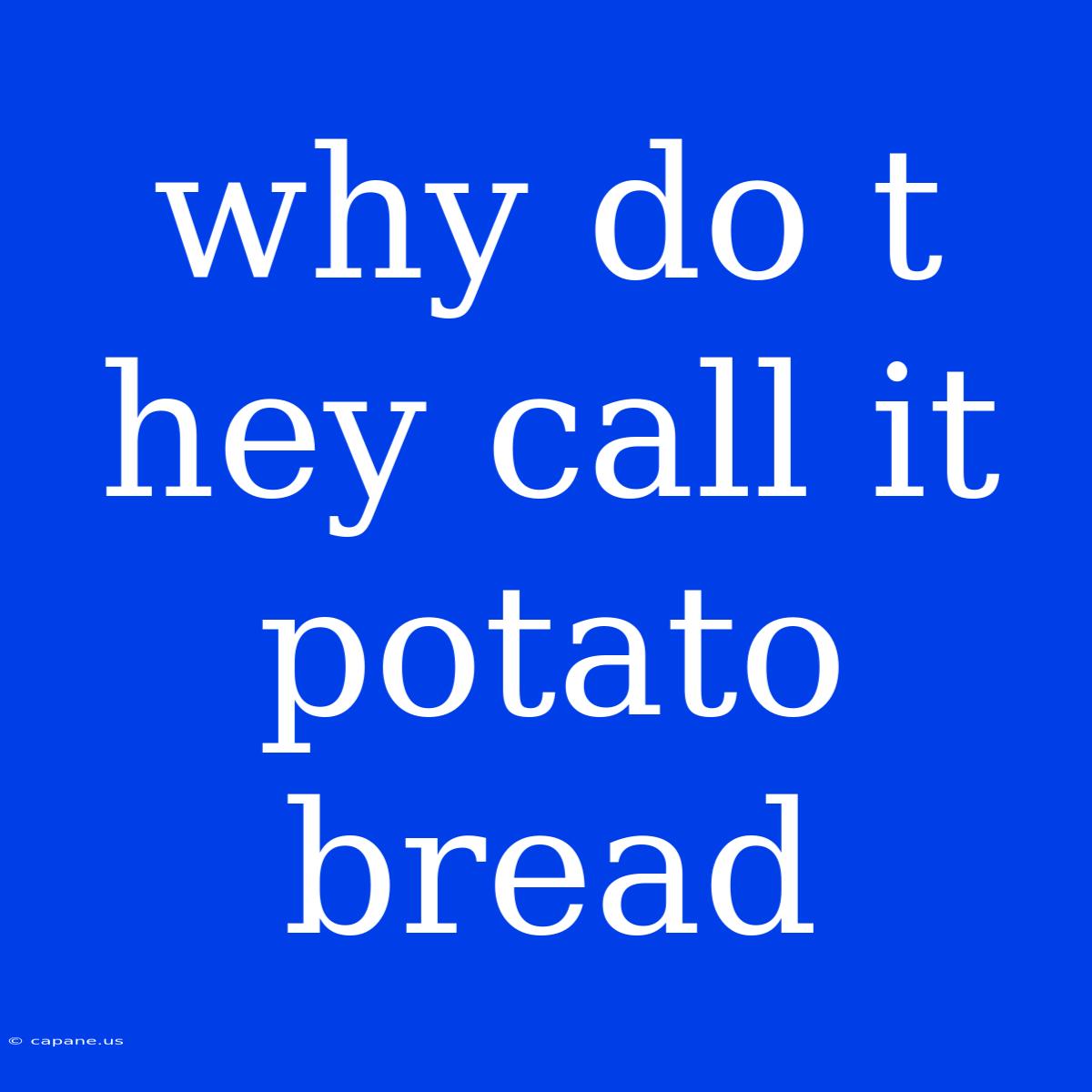Why Do They Call It Potato Bread? Unmasking the Secrets of This Beloved Loaf
Have you ever wondered why potato bread is, well, potato bread? This seemingly simple question leads to a fascinating journey through culinary history, baking techniques, and the power of ingredients. Let's dive into the world of potato bread and uncover the secrets behind its name.
Editor Note: This article explores the history and science behind potato bread, delving into the reasons behind its iconic name. Understanding the intricacies of this beloved bread can enhance your baking knowledge and appreciation for its unique qualities.
Why is this topic important? Potato bread, with its soft, fluffy texture and subtle sweetness, holds a special place in many hearts. Understanding the origins of its name, its baking techniques, and its unique characteristics can deepen our connection to this culinary staple.
Analysis: Our exploration delves into historical records, scientific studies, and culinary expertise to provide a comprehensive understanding of potato bread's name. We will explore its origins, baking techniques, and the science behind its distinctive texture.
Key takeaways:
| Aspect | Explanation |
|---|---|
| Origin of the Name | Derived from the use of potatoes in the dough. |
| Impact of Potatoes | Enhances texture, adds moisture, and imparts a subtle sweetness. |
| Baking Techniques | Specific methods used to leverage the unique properties of potatoes. |
| Culinary Significance | A beloved staple in various cultures. |
Let's dive into the key aspects of potato bread:
Potato Bread: A Culinary Journey Through Time
Origins and History:
Potato bread's journey began centuries ago, likely in regions where potatoes were readily available. Its origins are intertwined with the history of potato cultivation and the ingenuity of bakers. The addition of potatoes to bread dough was a practical solution, enhancing texture, moisture, and flavor.
The Role of Potatoes:
The addition of potatoes to the dough plays a crucial role in shaping the bread's unique characteristics. Potatoes contribute:
- Texture: They impart a softer, more tender crumb compared to traditional wheat bread.
- Moisture: Potatoes' natural moisture content helps to retain moisture during baking, resulting in a moist and flavorful loaf.
- Sweetness: Potatoes contribute a subtle sweetness that enhances the overall taste.
Baking Techniques:
The use of potatoes necessitates specialized baking techniques. Bakers often:
- Boil or Mash: Potatoes are typically boiled or mashed before being incorporated into the dough. This ensures they break down properly for optimal texture.
- Careful Mixing: The dough needs to be mixed gently to prevent overdevelopment of gluten, which can lead to a tough texture.
- Moderate Baking: Baking at moderate temperatures ensures even cooking and a soft, fluffy crumb.
The Science Behind the Name:
Potato Bread is named after the central ingredient that defines its character. The use of potatoes, a starchy vegetable, directly influences the bread's texture, moisture content, and flavor.
How Potatoes Transform Dough:
- Starch Interaction: Potato starch interacts with gluten in the dough, creating a softer, more tender texture.
- Moisture Retention: Potatoes retain moisture, contributing to a moist and flavorful loaf.
- Subtle Sweetness: The natural sugars in potatoes impart a delicate sweetness.
Beyond the Name: Culinary Significance
Potato bread has transcended its namesake to become a beloved staple in many cultures. It is often enjoyed as a sandwich bread, alongside soups and stews, or simply toasted with butter. Its versatility and comforting flavors make it a staple in kitchens and bakeries worldwide.
Variations and Adaptations:
The basic potato bread recipe has been adapted and modified over time, leading to diverse variations. Some popular examples include:
- Sweet Potato Bread: Incorporates sweet potato puree for a richer, more vibrant flavor.
- Garlic Bread: A classic variation with a savory garlic-butter topping.
- Potato Rolls: Small, fluffy rolls made with potato dough.
In conclusion, the name "potato bread" succinctly captures the essence of this beloved loaf. It speaks to the integral role of potatoes in shaping its unique characteristics and culinary significance. From its origins to its baking techniques and culinary adaptations, potato bread offers a fascinating glimpse into the world of bread-making and the power of ingredients.

